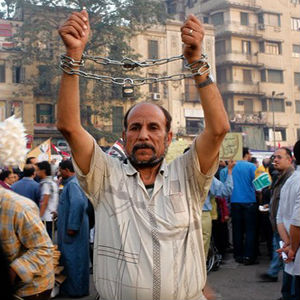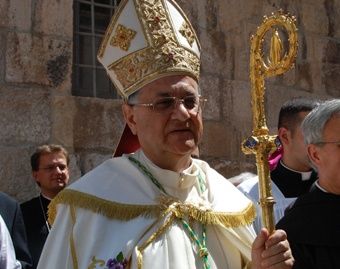
KNOXVILLE, TN (Catholic Online) - America's children (and many parents) woke up bleary-eyed Christmas morning in excited anticipation of colorfully wrapped presents waiting for them under the Christmas tree. But it was not so joyful in many places throughout the world. In some Muslim countries, Christians are afraid to openly celebrate their faith; in others, they do so reservedly. It was a mixed bag for the Coptic Christians of Egypt this year. Their new government stuffed an Islamist-based constitution in their stockings. This New Year's Eve, people around the world will celebrate the coming year in hope of a new and better future. But the Copts will pray that they will be able to live in freedom from persecution and celebrate Christmas in peace next year.
The controversy surrounding Egypt's new constitution goes back to April of this year, when the General Council for the Coptic Orthodox Church unanimously decided to withdraw from talks on the constitution. Shortly thereafter committee members from the Coptic Catholic Church and the Protestant Christian community followed. But it was not just Christians who were frustrated by the Islamists. Many members from Egypt's secular parties also pulled out of the talks for the same reason. The reason for these pullouts was that the drafting committee for writing Egypt's new constitution was dominated by Islamists. Christians and liberal Muslims believed the committee should represent the nation's diversity, but Islamists said it should reflect the composition of parliament. Islamist groups made sweeping victories in the recent parliamentary elections, and they claimed that their victories gave them a mandate to Islamize Egypt.
The Muslim Brotherhood was the biggest winner. They secured approximately 47 percent of the available seats in the lower house. The Salafis came in second with about 25 percent. Both Islamist groups, the Muslim Brotherhood and the Salafis, did almost as well in the upper house. However, a court did not agree that they had a mandate to Islamize the country. Consequently, the court dissolved the committee charged with writing Egypt's new constitution, or at least they attempted to dissolve it. In November, President Morsi responded to the delays surrounding the drafting of the constitution. In an effort to hold a referendum on a new constitution before the end of the year, he issued a declaration giving himself sweeping, dictatorial-style power. President Morsi thereby banned all challenges to his decrees and decisions. He also declared that no court could dissolve the committee drafting the constitution, and he fired the head of the judiciary.
The President's actions unleashed a firestorm. A group of judges said, "The state of law is at stake." The Vice-President of the Supreme Constitutional Court, Tahani al-Gebali, said that Morsi was now an "illegitimate president." And Mohamed ElBaradei, a Nobel Peace Prize winner, said, "Morsi today usurped all state powers and appointed himself Egypt's new pharaoh." Some protestors trashed the offices of the Freedom and Justice Party and the Muslim Brotherhood. President Morsi was forced to flee for his safety as protestors marched on the presidential palace in Cairo and clashed with supporters of the Muslim Brotherhood. At one point, an estimated 200,000 protestors flooded into Cairo's famous Tahrir Square, the home of the Egyptian revolution two years ago.

Jerusalem,Dec 27, 2012 / 04:11 am (CNA/EWTN News).- The Latin Patriarch of Jerusalem, Archbishop Fouad Twal, has issued a Christmas message that both laments the violence and refugee situation in the Middle East and calls on Christians to live out their faith.,“The joy of Christmas is overshadowed by the staggering violence in Syria,” he said Dec. 20. He noted the Catholic Church’s work to assist 250,000 Syrian refugees in Jordan, saying this shows the Church is “full of compassion for the victims.” Conflict between rebel forces and the Syrian government has killed tens of thousands of people and driven many more from their homes.
The refugees are mainly women and children who need food, shelter, medical treatment and clothes. Caritas Jordan director Wael Suleiman told Fides news agency in November that the Syrian refugees’ numbers in the country could reach half a million by April 2013 if the conflict is not resolved. In addition to the refugees from Syria, there are hundreds of thousands of Iraqi refugees already in Jordan.
Patriarch Twal said that Catholics pray that Jordan will “maintain its stability and common sense.” In the regional picture, there are many concerns surrounding the Middle East situation that leave Christians “perplexed,” but they desire “more stability and democracy,” he said. Patriarch Twal denounced the “severe restrictions” affecting 1.6 million Palestinians, saying they generate “hatred and hostility towards Israel.” He said United Nations recognition of Palestine as a nonmember observer is “a step towards peace and stability.” Israel, he said, can negotiate “on equal state-to-state terms for the good of all.”The Catholic bishops and patriarchs of the Middle East consider the Israel-Palestine conflict as the cause of all conflicts in the region and stress the urgent need for a “just and peaceful solution.” Patriarch Twal urged President Barack Obama to take “immediate action” for a two-state solution. He also spoke of the need for the presence of Christians in public life, pointing to the media as a way for Christian citizens to “assume their historic role,” express values of non-violence and encourage dialogue with believers of other religions. “We are a minority but we are more than just a number,” he said. “I encourage all our faithful to live this Year of Faith in earnest,” he added, invoking the first Christians of Jerusalem as a “model for renewal.” The patriarch thanked those who had participated in interreligious initiatives and stressed the ability of religious leaders to work for peace if they work together. However, he said the meetings did not prevent “an increase in a certain religious radicalism.”
“Interreligious dialogue can only bear fruits in acts of mutual respect,” he said, voicing “dismay” at the ongoing desecrations of churches, convents, synagogues and cemeteries in the Holy Land. In February, the Monastery of the Holy Cross in Jerusalem was vandalized with the words “Death to Christians.” Early in the morning of Sept. 4, vandals set fire to the door of the Latroun Monastery near Jerusalem and spray painted the walls with blasphemous phrases about Jesus in Hebrew. Another vandal attack happened Oct. 2 on the Convent of St. Francis on Mt. Zion, next to the Cenacle complex traditionally regarded as the site of the Last Supper. The graffiti attack derided Jesus and used a phrase common among Israeli extremists for a revenge attack on Palestinians and Arabs.
Khazen History


Historical Feature:
Churches and Monasteries of the Khazen family

St. Anthony of Padua Church in Ballouneh
Mar Abda Church in Bakaatit Kanaan
Saint Michael Church in Bkaatouta
Saint Therese Church in Qolayaat
Saint Simeon Stylites (مار سمعان العامودي) Church In Ajaltoun
Virgin Mary Church (سيدة المعونات) in Sheilé
Assumption of Mary Church in Ballouneh
1 - The sword of the Maronite Prince
2 - LES KHAZEN CONSULS DE FRANCE
3 - LES MARONITES & LES KHAZEN
4 - LES MAAN & LES KHAZEN
5 - ORIGINE DE LA FAMILLE
Population Movements to Keserwan - The Khazens and The Maans
ما جاء عن الثورة في المقاطعة الكسروانية
ثورة أهالي كسروان على المشايخ الخوازنة وأسبابها
Origins of the "Prince of Maronite" Title
Growing diversity: the Khazin sheiks and the clergy in the first decades of the 18th century
Historical Members:
Barbar Beik El Khazen [English]
Patriach Toubia Kaiss El Khazen(Biography & Life Part1 Part2) (Arabic)
Patriach Youssef Dargham El Khazen (Cont'd)
Cheikh Bishara Jafal El Khazen
Patriarch Youssef Raji El Khazen
The Martyrs Cheikh Philippe & Cheikh Farid El Khazen
Cheikh Nawfal El Khazen (Consul De France)
Cheikh Hossun El Khazen (Consul De France)
Cheikh Abou-Nawfal El Khazen (Consul De France)
Cheikh Francis Abee Nader & his son Yousef
Cheikh Abou-Kanso El Khazen (Consul De France)
Cheikh Abou Nader El Khazen
Cheikh Chafic El Khazen
Cheikh Keserwan El Khazen
Cheikh Serhal El Khazen [English]
Cheikh Rafiq El Khazen [English]
Cheikh Hanna El Khazen
Cheikha Arzi El Khazen
Marie El Khazen